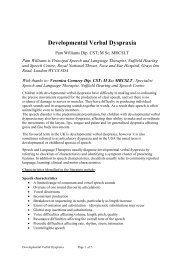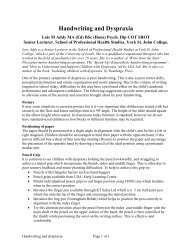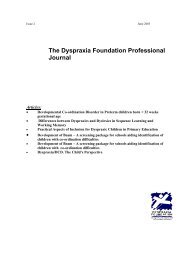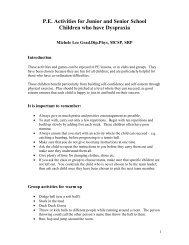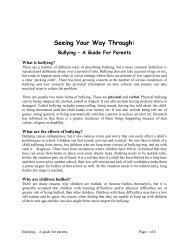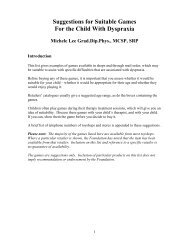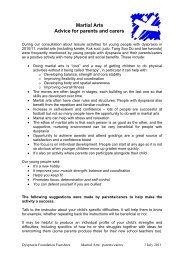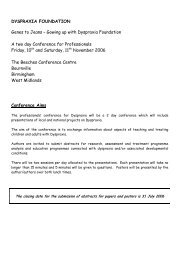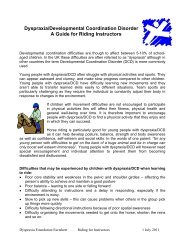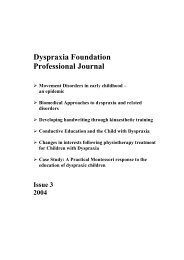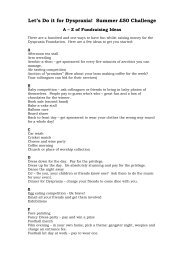Employers Guide - Dyspraxia Foundation
Employers Guide - Dyspraxia Foundation
Employers Guide - Dyspraxia Foundation
You also want an ePaper? Increase the reach of your titles
YUMPU automatically turns print PDFs into web optimized ePapers that Google loves.
<strong>Dyspraxia</strong> <strong>Foundation</strong> <strong>Guide</strong> For <strong>Employers</strong><br />
Cognitive Style Differences<br />
What are cognitive style differences?<br />
Everybody has his or her own particular way<br />
of working and thinking - we develop our own<br />
style. Organisations usually create set<br />
procedures that are considered most useful<br />
to the majority of the workforce. People with<br />
neurodiverse profiles may go about tasks in a<br />
different way because of their specific<br />
difficulties.<br />
Although many people want to support and<br />
help disabled staff in the work place,<br />
misguided line managers may put undue<br />
stress on their staff by requiring them to carry<br />
out tasks in the same way as other<br />
employees. The line manager may make<br />
inappropriate judgements about a staff<br />
member who is working in a style more<br />
appropriate to his own skills. Misguided<br />
intervention could prevent an individual<br />
achieving a result that is as effective as other<br />
members of staff, but by a different route.<br />
People all have their own modality strengths<br />
– some people prefer to be told how to do a<br />
task, others may like to be shown, others may<br />
prefer the hands-on approach where they<br />
carry out a given task. A combination of all<br />
three may help others. If an individual has one<br />
sensory channel that is less efficient than the<br />
others, it is important for line managers to find<br />
a way to help. Finding a new approach to<br />
carrying out a task may help other members<br />
of staff work more efficiently.<br />
How cognitive style differences can affect<br />
people in the work place:<br />
• Staying late to ‘catch up’.<br />
• Inability to complete tasks on time.<br />
• Doing things differently.<br />
• Becoming stressed.<br />
• Taking too much time off.<br />
• There may be conflict with other work<br />
colleagues.<br />
• Capability procedures.<br />
• Poor reports/appraisals.<br />
• Frustration for the individual and/or line<br />
manager.<br />
• Staff resigning.<br />
• Sickness.<br />
• Poor quality of work.<br />
• Dissatisfaction.<br />
• Staff skills being under-utilised.<br />
What adjustments can be made to help?<br />
• Divide tasks into small chunks,<br />
re-evaluate how they may be tackled.<br />
• Prioritise tasks.<br />
• Change of management style e.g. give<br />
demonstrations rather than<br />
assume understanding.<br />
• Use models or templates for<br />
documents.<br />
• Provide a buddy or mentor to explore<br />
specific areas of difficulty.<br />
• Allow employees to go to a quiet area<br />
away from the telephone or other<br />
office distraction for a period each day<br />
to quietly focus and concentrate.<br />
• Evaluate the appropriateness of a job.<br />
• Taking too much work home at the<br />
weekend.<br />
Produced by Key 4 Learning Ltd



